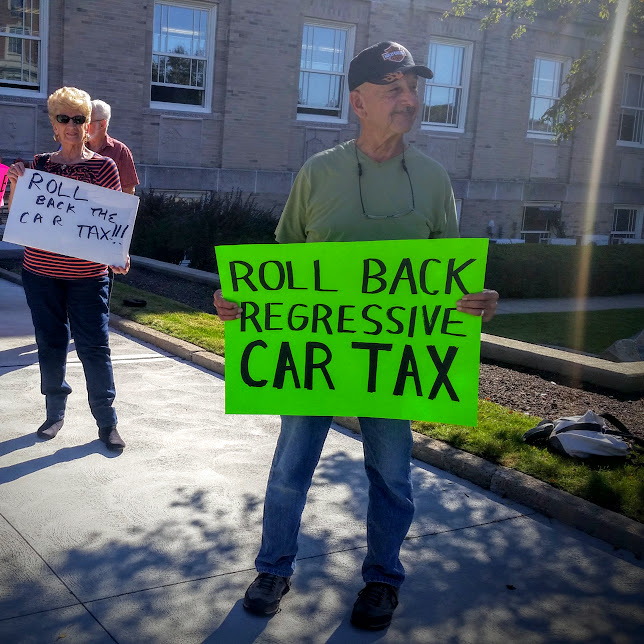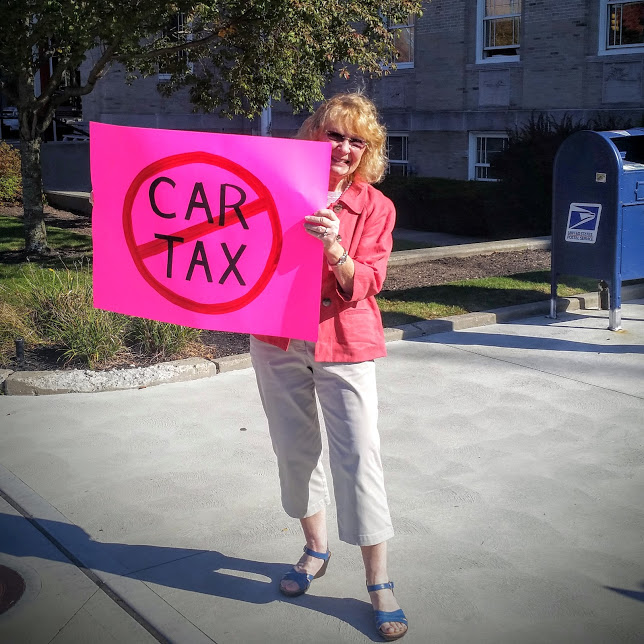Like the weather, it appears that everybody in Rhode Island loves to talk about the state’s car tax but nobody ends up actually doing anything about it. The Vehicle Value Commission has the power to do something about it, and bears responsibility for the frustration and, sometimes, anger that taxpayers in the state have about it. For years, the ACLU of Rhode Island has submitted testimony to the Commission to encourage revisions to these regulations in order to address that frustration and bring some semblance of fairness to the valuation process. No revisions have ensued, unfortunately. Despite our lack of optimism that this year will be any different, we offer our views once again.”
 So begins the ACLU of Rhode Island’s detailed seven-page testimony to the Rhode Island Vehicle Value Commission submitted this week in advance of a public hearing on the Commission regulations on November 10th. The testimony includes a thorough review of the car tax statute and regulation’s history.
So begins the ACLU of Rhode Island’s detailed seven-page testimony to the Rhode Island Vehicle Value Commission submitted this week in advance of a public hearing on the Commission regulations on November 10th. The testimony includes a thorough review of the car tax statute and regulation’s history.
According to the Commission, the ACLU’s testimony notes, almost all of the approximately 900,000 cars registered within the state are free of mechanical defects, have only “minor surface scratching with a high gloss finish and shine,” an interior that “reflects minimal soiling and wear,” and “all equipment in complete working order.” That is because the regulations establish the value of used cars up to 17 years old by relying solely on the National Automobile Dealers Association’s (NADA) designated “clean retail value” of the car based on its make and model. Such a presumption, claims the ACLU testimony, “defies reality.”
The ACLU of Rhode Island has long called on the R.I. Vehicle Value Commission to stop using this unrealistic vehicle valuation to determine car taxes and to also adopt a meaningful appeals process for Rhode Island car owners, and this year’s testimony does the same.
Not only do Rhode Island drivers face heavy taxes that do not match the true value of their vehicles, they are also denied any meaningful appeal process to have their vehicles recognized fairly. The Commission’s consideration of appeals of its “presumptive value” consists solely of checking for clerical errors, allowing adjustments to be made only when an incorrect NADA car value was inadvertently imposed, not when the taxpayer challenges the NADA figure itself based on, for example, local selling conditions.
In its written testimony, the ACLU said: “Such cold efficiency, which essentially rewrites the word ‘presumptive’ out of the statute, is a disservice to the taxpayers and to basic principles of due process.” The testimony continued: “[W]e leave it to the Commission members and others to suggest alternative methods of establishing a ‘presumptive value’ for motor vehicles; all that we can say is that something more meaningful than the current procedure is essential in order to add some fairness to the methodology.” The ACLU noted that the Commission could consider using local retail sales prices to set vehicle values, break down car models into categories by years, or consider other factors. As it has done at past hearings, the ACLU also called on the Commission to establish a meaningful appeals process.
A copy of the ACLU’s testimony is available here.



 The electoral race between Speaker of the House Nicholas Mattiello and his Republican challenger Steven Frias has, for obvious reasons, drawn an incredible amount of attention. Both candidates are working very hard to capture every vote they can in their district. But one exceptional aspect of their race has gone unmentioned: they have fewer people to convince to vote for them than in all but one other House district.
The electoral race between Speaker of the House Nicholas Mattiello and his Republican challenger Steven Frias has, for obvious reasons, drawn an incredible amount of attention. Both candidates are working very hard to capture every vote they can in their district. But one exceptional aspect of their race has gone unmentioned: they have fewer people to convince to vote for them than in all but one other House district.
 There is another impact that flows from this practice: the voting strength of the communities from which the inmates come is diluted, while the political influence of the city residents in which the prison is located is inflated. By inappropriately counting the 1,230 ACI inmates as District 15 residents, every resident of the state not living there has his or her representation diluted by about 8% compared to residents in district 15. Put another way, by virtue of his location, the House Speaker is more powerful than other legislators not just because of his title, but because 92 constituents of his House District have the same influence as 100 residents in almost every other district. (Only neighboring District 20, which also includes portions of the ACI, wields a bigger disproportionate influence.)
There is another impact that flows from this practice: the voting strength of the communities from which the inmates come is diluted, while the political influence of the city residents in which the prison is located is inflated. By inappropriately counting the 1,230 ACI inmates as District 15 residents, every resident of the state not living there has his or her representation diluted by about 8% compared to residents in district 15. Put another way, by virtue of his location, the House Speaker is more powerful than other legislators not just because of his title, but because 92 constituents of his House District have the same influence as 100 residents in almost every other district. (Only neighboring District 20, which also includes portions of the ACI, wields a bigger disproportionate influence.)
 oin the ACLU of Rhode Island and the Brown University Chapter of ACLU-RI on Thursday, February 4, for a free screening of Citizenfour and a discussion of surveillance and privacy in the digital age.
oin the ACLU of Rhode Island and the Brown University Chapter of ACLU-RI on Thursday, February 4, for a free screening of Citizenfour and a discussion of surveillance and privacy in the digital age.